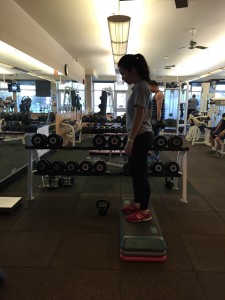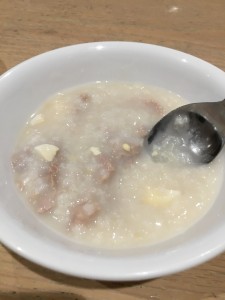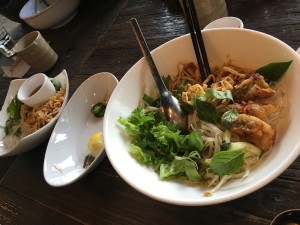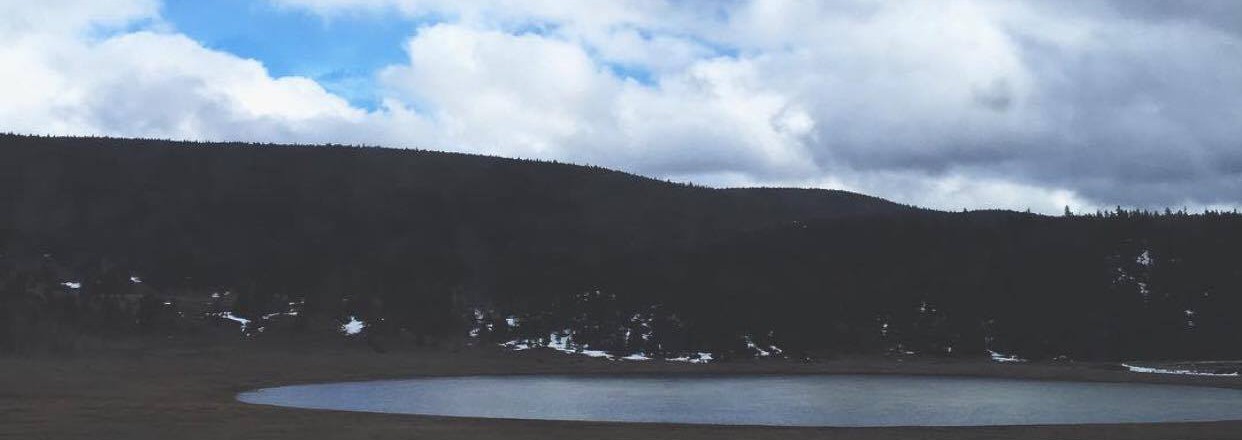Week 10: Photo Activity (March 14 – 18, 2016)
I took these pictures to represent the different ways that my family and I express care for ourselves and each other. I practice self-care through exercising at my local community centre, because I value my health and wellbeing. My parents express their care for my siblings and I through the food they make for us, such as the congee pictured below. And lastly, my family and I express care for one another by taking time out of our busy schedules to eat and spend time together.



Week 8 & 9: Survey reflections (February 29 – March 11, 2016)
It’s been quite busy over the last couple of weeks! Therise, Cheng Yee and I have finally completed our preliminary survey, which will be administered after Skyline students return from Spring Break. In my opinion, one one of the most challenging aspects about creating this survey were our use of terminology. Because this survey was designed for obtaining demographic information, I found it difficult to phrase questions relating to race, ethnicity and gender. While we followed a similar format as a UBC administered survey, I still felt that our options to certain questions were limiting and non-inclusive. For example, one of our survey questions asked respondents to indicate which gender they identified with. Our options for students to respond to this question were male, female and LGBTQ+. Technically, the terms male and female refer to biological sex and not gender. Moreover, I felt uncomfortable with lumping non-gender conforming individuals into one category, as it masked the diversity of experiences that exist.
Yet, our group chose to use more general terminology because we wanted the survey to be relatively easy for the students to fill out. While we traded the use of politically correct language for the user friendliness of our survey, I think that our use of multiple research methods will provide us with alternative perspectives to what will be generated by our survey. As Craig discussed in his lecture, triangulation is a useful approach that provides a more holistic understanding of the phenomenon at hand. While the use of multiple methods within research is not used to refute perspectives generated by other methods, triangulation does offer insight into perspectives that we may not have previously considered. Thus, while I may not be completely happy with how our survey was structured, our other research methods, such as our use of focus groups, may generate more nuanced insight into the issues that Skyline students currently face.
Week 7: A researcher’s positionality (February 22 – 26, 2016)
This week, our guest lecturers provided me with insightful examples of the various ways in which research is with Indigenous communities being approached. After reflecting on the various positionalities of our guest speakers this week, some of the questions that I was left with are as follows:
- From what perspective am I approaching my research with my community partner?
- What personal biases do I bring into my work? How can this privilege certain aspects over others?
Even though my group members and I are considered researchers, I am in no way considered an expert if we go by conventional definitions of this term. Rather, I am still trying to learn more about the issues faced by alternative education programs, and the experiences of actually being enrolled in such a system. Moreover, while I’ve worked with youth in the past, I’ve never worked with youth in an alternative education setting. Thus, I’ll be relying on our community partner for guidance in terms of how my group members and I interact and conduct research with the students. For these reasons, I do not see myself conducting research through the expert-subject dichotomy. Rather, I think both my community partner and I are actively engaging in a reciprocal relationship through the sharing of knowledge. As for my biases, I’ve noticed that I tend to pay more attention to race and class issues because of my personal background. While I may be particularly interested in examining these areas, I also need to consider how these issues interlock with other social positions, such as gender, ability or sexual orientation. Otherwise, my work may not capture the complexity of the situation at hand.
This week, Cheng Yee, Therise & I were able to put together two preliminary surveys that we will administer prior to our departure. The first survey will be completed online, and will enable us to get general demographic information about the students at Skyline. The second survey will be completed on paper, and will allow us to learn about the students’ identified areas of need. We plan to speak to our community partner on Tuesday to revise the surveys before we send them out in March. Some revisions that we need to make include clarifying ambiguous terms, and rephrasing yes/no questions. These surveys provide us an opportunity to engage with the Skyline students prior to our arrival in Williams Lake, and will help us refine our research question and plan our focus groups.
Week 5 & 6: Revisiting my positionality (February 1 – February 12, 2016)
Over the last two weeks, our class activity on conducting focus groups and guest lecturer on data visualization have encouraged me think more about the end result of our project. While it is important and exciting to plan our focus groups and think about how we will visualize our data, I think that my group and I still need to narrow down our research question. Having a solid research question will help guide us through the work we will do in the coming months, so I am eager to work on this with my group after reading break.
As I began my research for the Williams Lake timeline activity, I discovered something that I had not previously known. In 1864, there was a confrontation between members of the Tsilhqot’in (Chilcotin) nation and white road construction workers. The road crew was starving and underpaying the Tsilhqot’in workers and sexually abusing young Tsilhqot’in women. This provoked the chief of the Tsilhqot’in nation to declare war on the white workers. During a confrontation, some of the road crew workers were killed. Later on, the Tsilhqot’in chief and his followers were captured and killed under false pretences of a peace negotiation. The City of Williams Lake was named in honour of Secwepemc (Shuswap) chief William, whose counsel prevented their nation from joining the Tsilhqot’in in their rebellion against the white settlers.
Learning about this piece of history about Williams Lake has encouraged me to revisit my positionality as a settler learning on Musqueam territory. In learning about the histories and current issues of Coast Salish nations in Vancouver, I also need to make an effort to educate myself about other First Nations groups, as their experiences cannot stand in place of one another. To assume that Indigenous history and issues in Williams Lake are the same as those in Vancouver would homogenize the experiences of Indigenous peoples. As such, in recognizing my position as a settler who will be conducting research on traditional territories of the Secwepemc First Nations, I must continue to learn about the historical and modern issues that these peoples have faced.
Week 4: Reflecting on representation (January 25 – 29, 2016)
This week, May Farrales’ lecture on participant observation gave me greater insight on the advantages and limits of this methodological approach. One of the limitations that resonated with me is the idea that representation is not innocent. As May suggested, representation is violent because one takes something from the original moment, and reshapes and retells it for a particular purpose. Different meanings may arise depending on how the observations are represented. The question then is, for what purpose? Power relations are very much at play during the research process, so I think it is important to reflect on what one hopes to achieve through particular methods of collecting and representing information.
As my group will likely conduct surveys and focus groups with students, it is important to think about how their insights and experiences will be represented. Will we represent the information in its original form, or paraphrase and summarize the results? How will our community partner and research participants react to how they are being represented?
While my group members and I have discussed ideas for how to publish our results, we will need to speak to our community partner, as well as our research participants, to see how they would like to be represented. Ultimately, I think that it is important to be mindful of our community partner’s boundaries and comfort levels when deciding on how to represent our project.
Week 3: Meeting our community partner! (January 18 – 22, 2016)
This week has been an exciting one, as we were finally able to meet our community partner. On Thursday, we had a Skype call with Mark Thiessen, superintendent of School District 27. Meeting with him allowed us to identify a starting point for our project, and gave us a better idea of what direction we’ll be heading towards. In short, we will be working closely with Skyline Alternate School, and build off of what was done by last year’s group.
During our call, we were able to identify some potential research questions for our group. They include:
- What measures can Skyline Alternate take to better accommodate the various needs of its students?
- As students tend to switch from regular to alternative schooling, what do regular schools need to offer to encourage students to stay there?
Based on these preliminary questions, it appears that we will need to conduct surveys or interviews with students to gain insight on their needs and motivations. However, we can also use secondary data to support our research questions. Our guest lecturer of the week, Kelly Schultz, offered us valuable resources for finding and using secondary data. There is a wealth of information available online, and is offered by national, provincial and municipal data sources. I think a good approach is to obtaining relevant data is to begin by identifying an area of interest. This can help narrow down the data sources that we explore. Using filters and keywords can also help with refining the search. Important considerations include when the data was collected, what format it is offered in, as well as the quality and detail of the data. As no data source is perfect, it would be a good idea to use multiple data sources. This can provide various perspectives on our area of interest, and safeguard against potential biases in the data.
Week 2: Positionality, ethics and group work (January 11 – 15, 2016)
This week, our guest lecturer from the Centre for Community Engaged Learning really encouraged me to think more about my learning experience in relation to my community partner. Some of the key takeaways from this lecture include considering an asset based approach to community development, whereby we identify the existing assets within a community and try to develop/strengthen their skills. While this may sound simple in theory, I think that executing this approach may be a bit challenging. From my experience as a Peer Tutor, facilitating skill development can be difficult because it often requires me to take a step back and let my clients learn through their challenges or mistakes. However, this has also allowed me to learn how to better facilitate skill development. While the context of this project is different, I think the learning process is similar in that it will be reciprocal in nature. In designing our research project, I must remember that this work belongs to the community as well. As such, I will try my best to recognize when I need to step back and provide the space for others to learn or share their knowledge.
A key part of experiential learning involves pairing action with reflection. This week, we were asked to reflect on our positionality, and how it may influence our research in Williams Lake. In reflecting upon my various social positions, the one that stands out to me the most is my position as an outsider to the Williams Lake community. While our community partners may be thrilled to be working with us, I wonder if there may some apprehension amongst community members regarding our presence in Williams Lake. After all, we will only be conducting research at Williams Lake for a week. Any potential negative impacts from our research will be something that the community will have to deal with even after I am gone. How do we build trust with our community partner? Will it be harder since we do not belong to the community? Evidently, I must continually engage in critical reflection and check to see if our actions are benefiting the community, as this project extends way beyond my group members and I.
Since I am partnering with the School District, I anticipate working quite closely with educators and youth. As other studies, with we must obtain consent from our research participants prior to conducting to our research. This is especially important since we will interact with high school youth, who are presumably minors. Thus, we must obtain consent from their parents or guardians in order for them to be able to participate in our project. Another ethical consideration may be to ensure the confidentiality of our research subjects. Depending on our project’s focus, and our community’s comfort level, we will have to be mindful about the type and amount of information that we publish and disclose.
For students wishing to conduct any research involving human participants at/with UBC, their research project must be reviewed and approved by one of UBC’s six Research Ethics Board. Prior to applying for an ethics approval, researchers must register for RISe and complete the introductory tutorial for the Tri-Council Policy Statement (TCPS2 2014). Typically, a full board review process takes approximately 7 – 8 weeks, from the date of submission to the date of receipt of approval. Students must put their Faculty Advisor as their Principle Investigator, who is responsible for adhering the study to the Tri-Council Policy Statement and other relevant guidelines. A study that has been approved by another University must still obtain UBC ethics approval. More information on how to obtain UBC ethics approval can be found here and here.
As for my group members and I, I think we are working fairly well together. We communicate quite regularly through Facebook and Whatsapp, which enables us to stay updated with one another. I’ve noticed that all three of us tend to plan ahead, which I really appreciate. This allows us to identify what needs to be done, and delegate tasks accordingly. Since we haven’t heard back from our community partner yet, we are mainly focused on our blog and researching about Williams Lake. However, as things start to pick up, I think it might be useful to create an action plan that will outline the tasks and responsibilities of each person, accompanied by due dates for each item. I’ve used this strategy for planning events in the past, and have found it pretty useful for helping a team to stay organized. Hopefully other groups will find this tip helpful!
Week 1: Hello! (January 4 – 8, 2016)
I decided to take this course because it offers a unique hands-on opportunity to engage in community development and learn outside of a classroom setting. I see this class as an opportunity to develop my soft skills, – such as communication, teamwork, and project management skills. Moreover, as an outsider to the Williams Lake community, I am keen to learn how to organize from a position of responsibility. How should partnerships be approached when you do not belong to the community or are unfamiliar with it? What steps can be taken to ensure that the community can speak for themselves, rather than being spoken for? How can I balance my personal learning and growth while prioritizing the needs of the community? These are some of the questions I hope to address in the coming months.
This week, I was excited to find out that I would be teaming up with Cheng Yee and Therise to work with School District 27. I was drawn to working with this community partner because of the opportunity to engage and collaborate with youth to address pertinent issues in their lives. In the past, I’ve been involved with various youth projects and networks, and I look forward to sharing my experiences and skills with the School District.
On Friday, Therise, Cheng Yee & I went on our walking tour around the False Creek area. We got to know each other a bit more and even discovered our mutual affection for Michaels craft store. All in all, I am really excited to with my team and community partner!
